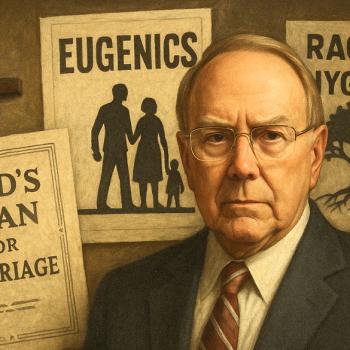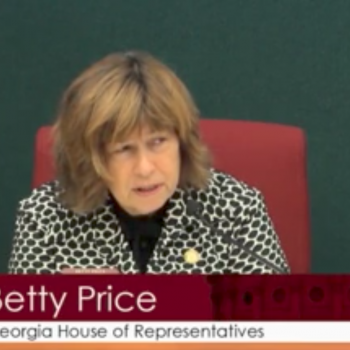Many LGBTQ Christians who attend a conservative, non-affirming church will at some point face an internal struggle: Should I stay where I’m not fully welcome, or should I find a new church? The question often produces a cocktail of emotions, especially for those who love their church and the relationships they’ve built. There’s often a tug-of-war between duty and self care, between a desire to change minds and the need to tend to one’s own tender heart.

We’ve attended both affirming and non-affirming churches, and our reasons have changed based on our life circumstances and where we felt Spirit leading us. If LGBTQ Christians are going to receive greater acceptance, we can’t all flock to the same kinds of churches: We need to be represented in a variety of faith communities. As such, there is no one-size-fits-all answer. If you’re wondering about what kind of church is right for you in this season of your life, use these questions to help guide you.
Am I (relatively) safe and supported at my non-affirming church?
In the most conservative of churches, admitting to being gay or even having same-sex attractions may be enough to get you kicked out. In these instances, there is no decision to be made. We aren’t talking about these kinds of churches. We’re also not talking about churches that promote the false belief that sexual orientation can be changed—if your church pushes any kind of ex-gay ministry, run! There are, however, many non-affirming churches today that allow “Side B” believers (those who believe gay people are called to celibacy) to remain in their congregation.
Just because you go to a non-affirming church doesn’t mean you can’t feel supported and spiritually fed, even in the context of your sexuality. Before we started dating, we attended a contemporary evangelical church in Los Angeles with traditional views on marriage. Although the church welcomed gay people to attend and worship, the leadership ultimately opposed same-sex marriage. Even so, the congregation had many straight, affirming members. Because of this, we were able to exist in this tension while still feeling as if we could be authentic and vulnerable. When we began to date, members of our home group had many questions and some concerns, but their inquiries came from a place of love, and no one sought to shame us or kick us out. On paper, the church condemned our relationship, but in reality we faced more support than conflict.
Although we had a generally positive experience, this won’t be the case for many churches. For some of you who come out to church authority, you’ll face conflict both subtle and overt. The leadership may assign someone to keep you accountable to celibacy (even though they’re not policing the sex lives of straight congregants). They may ask you to step down from responsibilities, or allow you to serve in some ministries but not others (making coffee might be OK, but teaching Sunday school not so much.) These are all subtle ways to shame, isolate, and control you. Unless you have a strong support network to buoy you, this is a difficult environment in which to thrive. It may be time to move on.
Have I been deeply wounded by the church, and am I still recovering?
With the amount of shame and ostracization that LGBTQ people have suffered in the church, we’re amazed at queer Christians who have managed to maintain their faith. Quite understandably, too many LGBTQ people leave the church and walk away from all things spiritual. Church PTSD is real, and it is one of the great tragedies of the faith.
Maybe you still call yourself a Christian, but you’ve stopped going to church because the wounds are too raw. Or perhaps you go, but you hide in the back and dash out the door the moment the service is over. Or you continue to serve but you put up walls to protect yourself from a community that has hurt you so badly. In cases such as these, going to a non-affirming church may prevent you from ever growing in your faith. You may find yourself stunted by your wounds and trapped in a toxic environment in which you’ll never freely breathe. You may still love certain aspects of that old church, but you may need to spend a season of life in one that can affirm your goodness, tend to your pain, and mend your heart. Psychological trauma is real, and it’s important to recognize times when it’s appropriate to step back and heal.
Am I dating or in a relationship? What would happen if I did?
Many non-affirming churches offer a veneer of hospitality toward LGBTQ Christians, most often while they’re single. But a church’s true colors are more likely to show once LGBTQ people begin entering into relationships. What was once theoretical is now actual, and this is when previously silent opponents in the church will most often speak up to object. It’s important to consider how dating may impact your experience at church, and whether the response would justify leaving.
We began dating at our non-affirming church, and we were lucky enough to face only a little conflict. As a small group leader, David had signed an agreement to refrain from any “homosexual activity” (whatever that means). To be in integrity, he scheduled a meeting with church officials to disclose our relationship and, if necessary, step down. Although it felt shaming for David to divulge details about our sexual choices, the fact that we saved sex for marriage encouraged the leaders to allow him to continue leadership of the small group. This is far more than most non-affirming churches would ever allow, and we were grateful for the leadership’s ability to move forward in uncertainty.
Even so, we both knew our time at the church was limited. At some point our relationship would clash with the church’s doctrine. Would they allow us to stay if we got married? Would our children be allowed to join in the kids’ ministry? Would we still be able to volunteer once we married and became sexually active? What if we needed marriage counseling, or some kind of family support? We didn’t stay long enough to find out. Circumstances brought us to Portland, and we found a church whose marriage practices included same-sex couples. It is exactly what we’ve needed in this season of life. We find ourselves in a community that edifies our relationship rather than opposes it, that helps us rather than hurts us. Instead of having to justify ourselves at church every Sunday, we can freely engage, serve, and practice our faith. Marriages wither in isolation, and we can’t imagine how we’d thrive without a strong faith community to support us.
What feels more important now: Support or engagement?
One of the best questions you can ask is how you envision yourself participating within a congregation. If you had to choose, what kinds of interactions are more important to you: ones in which you are giving and receiving support, or ones in which you are engaging in dialogue and challenging ideas? That’s not to say a church won’t offer both, but understanding your needs and gifts may help you decide what kind of church you should be in. It’s important, too, to recognize that what we need and what we have to offer may change over time.
For example, you may for a time need the support of an affirming church to help heal your wounds, but there may come a point where you may find yourself prepared to face the conflicts that arise in a non-affirming church. You may find your heart in a stronger, more confident position to engage with those who disagree. We need these kind of people who are willing to stand on the front lines of the debate, to absorb the brunt of the conflict and respond with loving, gracious strength. These are difficult interactions to have, but so important in building bridges.
Where is Spirit leading me?
Most important, take time in prayer to discern where the Holy Spirit is leading you. Spirit often tugs on our hearts when we are most comfortable or complacent. Perhaps you’ve stuck with your non-affirming church out of simple inertia, but Spirit may be calling you to make a change. It may be that your faith has grown stale, and it’s time to enter into a safe environment to re-discover the wonder and mystery of Jesus. Or perhaps you’ve filled your tank to the brim with love at your affirming church, but you’re not outwardly serving God’s kingdom with your gifts. It may be that you’ve become too comfortable, and it’s time to take a risk in an effort to find and help other hurting LGBTQ Christians who need you. It may be time to step out of safety and engage with those who will disagree with you.
When it comes to deciding upon a faith community, there is no one right answer, and our trajectories of growth may take us through many churches throughout our lives. “For everything there is a season, and a time for every matter under heaven.” (Ecclesiastes 3:1, NRSV)
Like our Facebook page and follow us on Twitter for more.
Photo by Natalie, used with permission through Flickr Creative Commons.
















